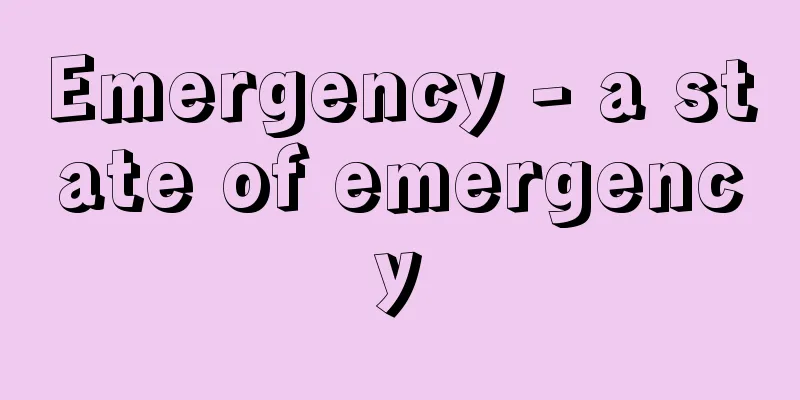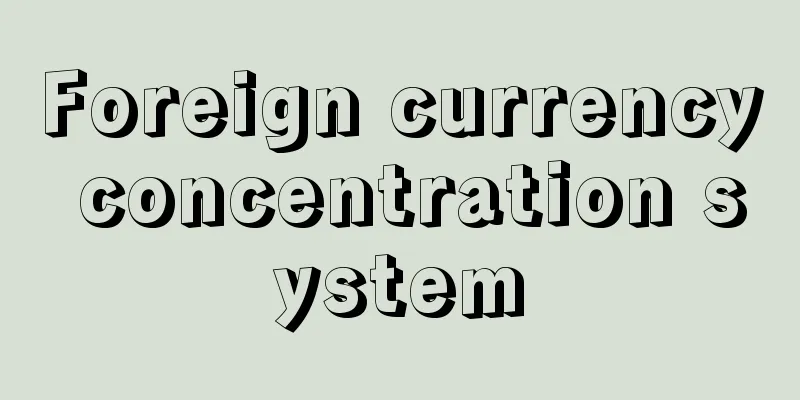Emergency - a state of emergency

|
A state in which there is an immediate danger to maintaining public order and security due to war, civil unrest, large-scale disasters, etc. As a measure to deal with this, a system of emergency powers that concentrates power in the hands of the President or the Cabinet is usually considered in the constitution. In Japan, under the Meiji Constitution, Article 31 stipulated the Emperor's supreme power (emergency powers) to suspend all or part of the rights of his subjects, but this power was never exercised. Under the current constitution, this system is not permitted due to the risk of abuse, and instead, provisions regarding emergency situations are included in laws (Police Act, Self-Defense Forces Act, Basic Act on Disaster Management, etc.). (1) According to the Police Law, the Prime Minister issues a proclamation of a state of emergency for the whole country or a part of the country based on the recommendation of the National Public Safety Commission (a declaration of a state of emergency. In the old Police Law, it was called a state of emergency). The Prime Minister then temporarily controls the police force and directly commands and supervises the Commissioner General of the National Police Agency. Since the normal relationship of police management is suspended, in order to maintain democratic control, the proclamation must be submitted to the Diet for approval within 20 days from the date of issuance (Article 71 and following). (2) According to the Self-Defense Forces Law, in the event of indirect aggression or other emergency situations where it is deemed impossible to maintain public order even with police power, the Prime Minister may order the mobilization of all or part of the Self-Defense Forces (public security mobilization order). The democratic control of the mobilization is the same as that of the Police Law (Article 78). (3) According to the Disaster Management Basic Act, in the event of a major disaster, the Prime Minister may issue a disaster emergency proclamation under certain conditions (Article 105). [Masaaki Ikeda] (4) According to the Special Measures Act on Nuclear Emergency Preparedness, in the event of a nuclear accident, the Prime Minister, based on a report from the Nuclear Regulation Authority, will publicly announce the occurrence of a nuclear emergency (declare a nuclear emergency) and instruct the implementation of emergency response measures, such as evacuation and recommendations to take shelter indoors (Articles 15 and following). (5) According to the Emergency Response Law and the Civil Protection Law, etc., attacks on nuclear facilities, explosions on bullet trains, etc., large-scale releases of toxic gases such as sarin, and suicide bombings by aircraft are defined as emergency response situations, and the Prime Minister decides on response policies at a Cabinet meeting. In the event of an emergency, appropriate and prompt action will be taken to protect the lives, bodies and property of residents. The Cabinet must submit the matter to the Diet for approval within 20 days of the Cabinet decision. (Articles 21-24 of the Emergency Response Law, Article 172 and following of the Civil Protection Law) There is no provision in the above emergency declarations stating that constitutional human rights will be suspended, but in practice it may come close to this. [Takeshi Yano August 20, 2020] [Reference items] | | | | | | |Source: Shogakukan Encyclopedia Nipponica About Encyclopedia Nipponica Information | Legend |
|
戦争、内乱、大規模な災害などによって治安や秩序の維持に緊急な危険が生じている状態。これに対処する措置として、普通は憲法上、大統領や内閣に権限を集中する緊急権の制度が考えられている。日本では、明治憲法の下で、臣民の権利の全部または一部を停止する天皇の大権(非常大権)を規定(31条)していたが、一度も発動されなかった。現行憲法では、濫用の危険があると考えられてこの制度は認められず、そのかわりに法律(警察法、自衛隊法、災害対策基本法など)に緊急事態に関する定めが置かれている。 (1)警察法によれば、内閣総理大臣が国家公安委員会の勧告に基づいて、全国または一部の区域について、緊急事態の布告を発する(緊急事態宣言。旧警察法では非常事態と称した)。そして総理大臣が一時的に警察力を統制して、警察庁長官を直接に指揮監督する。普通の警察管理の関係が停止するものであるから、その民主的コントロールのために、布告を発した日から20日以内に国会に付議してその承認を求めなくてはならないことになっている(71条以下)。 (2)自衛隊法によれば、間接侵略その他の緊急事態で、警察力をもってしても治安を維持することができないと認められる場合には、内閣総理大臣が自衛隊の全部または一部の出動を命ずること(治安出動命令)ができるとされている。その民主的コントロールについては、警察法の場合と同様である(78条)。 (3)災害対策基本法によれば、非常災害が発生した場合には、一定の条件の下に内閣総理大臣が災害緊急事態の布告を発することができるとしている(105条)。 [池田政章] (4)原子力災害対策特別措置法によれば、原子力事故が発生した場合、原子力規制委員会の報告に基づき、内閣総理大臣は原子力緊急事態が発生した旨の公示(原子力緊急事態宣言)をし、避難や屋内退避勧告などの緊急事態応急対策を指示する(15条以下)。 (5)事態対処法と国民保護法などによれば、原子力施設への攻撃、新幹線などの爆破、サリンなど有毒ガスの大量散布、航空機による自爆テロなどを緊急対処事態と規定し、内閣総理大臣が対処方針を閣議決定し、発生時には住民の生命、身体および財産を保護するため的確かつ迅速に対処する。閣議決定から20日以内に国会に付議してその承認を求めなくてはならない。(事態対処法21~24条、国民保護法172条以下) 以上の緊急事態宣言に際し、憲法上の人権を停止する旨の規定はないが、実際はこれに近いものとなる可能性がある。 [矢野 武 2020年8月20日] [参照項目] | | | | | | |出典 小学館 日本大百科全書(ニッポニカ)日本大百科全書(ニッポニカ)について 情報 | 凡例 |
<<: Emergency meeting - emergency meeting
Recommend
Tutton's salt
The chemical formula is (NH 4 ) 2 SO 4 ・MgSO 4 ・6H...
Tenkai
A Tendai Buddhist monk in the early Edo period. H...
Populaire European Party (English)
...On the other hand, in Latin America, Christian...
Nagahashi Station - Nagahashi Station
?-1352 A female court official during the Nanboku...
Jaiminisutra (English spelling)
...He is considered the founder of the Mīmāṃsā sc...
Suggrundus meerdervoorti (English spelling) Suggrundusmeerdervoorti
…It can refer to the Suggrundus meerdervoorti (il...
Ako Yanagi - Ryuashi
Chinese poet. His given name was Yigao, later cha...
Rami
...The plant itself and the decoction made from t...
Abura-gaya - Abura-gaya
A large perennial plant of the Cyperaceae family f...
Legal Training and Research Institute
Established in 1947 as an affiliated institution ...
Stern
...Life saw a dramatic increase in circulation ar...
Nemipterus virgatus - Thread-twisted sea bream
A marine fish of the family Pycnonotidae in the or...
Mitsubishi Zaibatsu
This zaibatsu was the second most powerful conglo...
True name - Mana
Manabon refers to the kanji itself, as opposed to...
Kinkai-style pottery
Also called Gimhae pottery. It was named after the...









